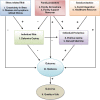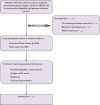Resilience and quality of life (QoL) of head and neck cancer and brain tumour survivors in Pakistan: an analytical cross-sectional study protocol
- PMID: 31542743
- PMCID: PMC6756343
- DOI: 10.1136/bmjopen-2019-029084
Resilience and quality of life (QoL) of head and neck cancer and brain tumour survivors in Pakistan: an analytical cross-sectional study protocol
Abstract
Background: Cancer is a devastating disease and has detrimental effects on the quality of life (QoL) of cancer survivors and interferes with their treatment compliance. The aim of the study is to assess resilience and QoL among cancer survivors and to evaluate the important factors affecting their resilience and QoL, with respect to the Pakistani cultural context.
Method and analysis: A cross-sectional study will be conducted at a tertiary care hospital in Karachi, Pakistan. A minimum sample size of 250 head and neck cancers and 250 brain tumour survivors with 10% inflation for non-response rate will be required. The SD of QoL and resilience will range from 16.5 to 40.8 for head and neck cancer, and 12.7 to 34.1 for brain tumour, at 5% level of significance, with 2.5 precision. QoL will be assessed by European Organization for Research and Treatment of Cancer (EORTC) QLQ-C30, EORTC QLQ-H&N35 and EORTC QLQ-BN20 and resilience will be evaluated by Wagnild and Young's 14-item scale. Mean±SD will be reported for resilience and QoL scores. Unadjusted and adjusted β-coefficients, with 95% CI, will be reported by using multiple linear regression analysis. Correlation analysis will also be performed using Pearson or Spearman rank correlation coefficients. A p value of <0.05 will be considered significant.
Ethics and dissemination: Ethical approval has been obtained from the Aga Khan University Pakistan's Ethical Review Committee. Written informed consent will be taken from the participants by trained research assistants. A trained psychologist will provide on-spot counselling to the participants and those identified with severe depression will be referred to a psychiatrist. The study materials will be kept under lock and key and the electronic data base will be password protected and will only be accessed by the research team. The study findings will be disseminated through publications conferences and workshops and research briefs.
Trial registration number: Clinicaltrials.gov registry (NCT03466762).
Keywords: adult oncology; head & neck tumours; oncology; psychiatry; public health.
© Author(s) (or their employer(s)) 2019. Re-use permitted under CC BY-NC. No commercial re-use. See rights and permissions. Published by BMJ.
Conflict of interest statement
Competing interests: None declared.
Figures
References
-
- WHO Cancer fact sheet 2018. Available: http://wwwwhoint/mediacentre/factsheets/fs297/en/;Lat [Accessed 16 Mar 2018].
Publication types
MeSH terms
Associated data
LinkOut - more resources
Full Text Sources
Medical
Miscellaneous


